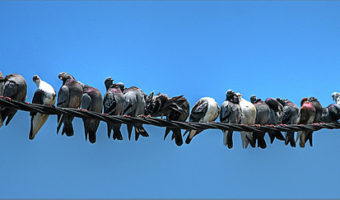A 100-Year-Old, Fat Crocodile from Bangladesh Died Due to Overeating!

You might’ve often seen the signboards in Zoos saying, “feeding the animals is prohibited.†But have you ever wondered why they would not let you feed the animals? The answer might just surprise you. It turns out that overfeeding wild animals can have deadly consequences, as one recent incident in Bangladesh shows. Discover the shocking story of a 100-year-old, fat crocodile that became obese and died as the worshippers overfed it.
The tragedy serves as a powerful reminder of the delicate balance between human intervention and wildlife preservation and raises important questions about our responsibility to protect and respect the natural habitats of wild animals. Learn about the implications of this tragedy and what it tells us about our relationship with the natural world.
Table of Contents
Why did they feed the fat crocodile?
The 100-year-old crocodile was a resident of a pool in Hazrat Khan Jahan Ali Shrine in southwestern Bangladesh’s Sadar Upazila. It was treated with reverence and respect by the local community and believed to have divine power. The worshippers who visited the shrine believed that offering chickens and goats to the crocodile would bring good luck and fulfill their desires.
Earlier, the worshippers used to offer chickens as an offering. However, the offerings increased over time as the shrine’s popularity grew for a few years. Not just that, but people even started offering goats to the crocodile, believing that a bigger sacrifice meant better chances of the fulfillment of a wish! The result was an extremely obese crocodile that endlessly gorged on the chickens and goats offered by the worshippers.

Although the shrine authorities were aware of the overfeeding issues with the crocodile, they did not know how to deal with it. One morning they found the crocodile floating upside down. Sadly, the crocodile died in 2015 due to obesity-related issues.
The fat crocodile is not the only crocodile to die in that pool!

What’s even more tragic about the Hazrat Khan Jahan Ali Shrine pool is that the fat crocodile was not the only one to die in that pool. Up until a few years ago, there used to be four crocodiles in the pool. It turns out that the earlier three crocodiles also had died one after another due to obesity-related issues.
While three crocodiles had already gone from the pool, the number of worshippers at the shrine had not declined. As such, the fat crocodile, who was still alive, had shares of the food meant for the three other crocodiles. It further contributed to the increased obesity in the centenarian creature.
Can obesity affect any animal?
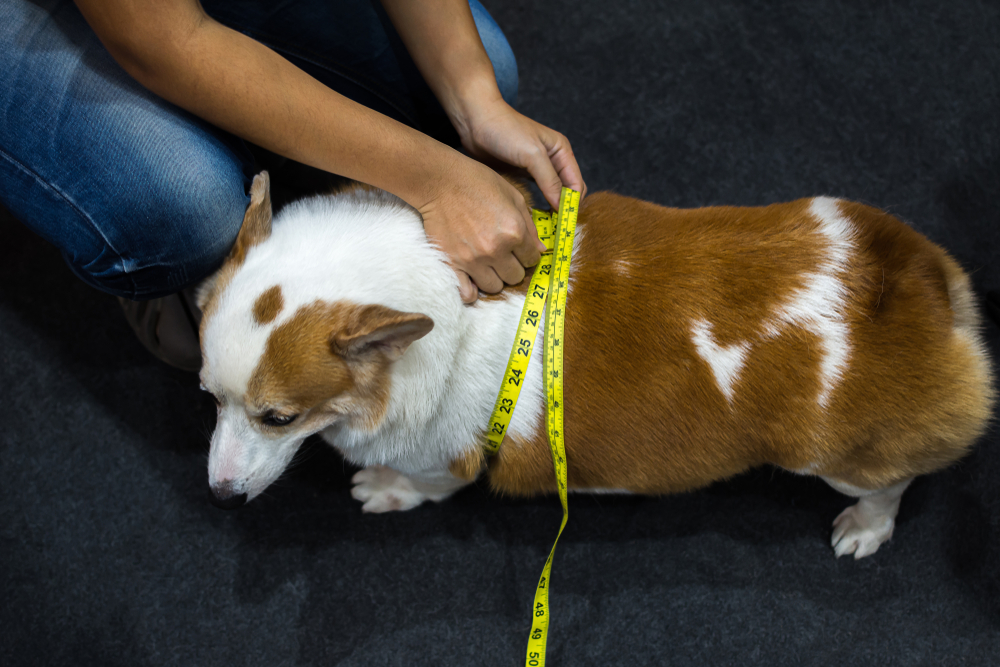
The case of the fat crocodile from Bangladesh is the perfect example that obesity isn’t just a problem for humans only. Animals all around the world are also affected by this issue. Rodents, primates, cats, dogs, and even zoo animals can all become overweight.
Scientists who have studied obese animals, such as mice with genetic mutations, monkeys, and dogs, say that obesity is much more prevalent in animals than one might think. Much like humans, this can be caused by factors such as changes in diet, lack of exercise, and genetics. Of all the reasons, they believe that human intervention contributes the most to animal obesity.
Unfortunately, obesity in animals can lead to a plethora of health problems, such as heart disease, type 2 diabetes, breathing difficulties, weak muscles, cancer, joint and back pain, skin problems, and fertility issues.
These fat animals point out that animal obesity needs to be addressed.
1 Albert, the polar bear, is regarded as one of the fattest polar bears on Earth!
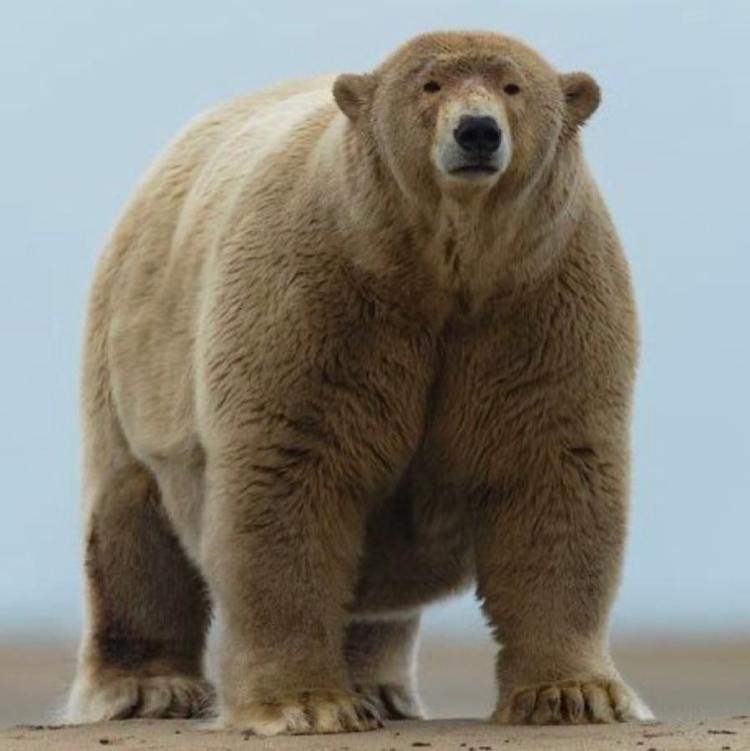
A polar bear that weighs more than a staggering 1,477 pounds in Alaska has been given the nickname “Fat Albert†due to its enormous size. Fat Albert weighs approximately 418 pounds more than the average weight of a polar bear, which is about 993 pounds.
However, the bear’s size and weight are not entirely of his own doing. As part of a long-standing Alaskan tradition, local people throw huge quantities of whale blubber (fat) for bears to show respect for them. While harvesting a whale, the villagers cut out a substantial amount of the whale and its blubber and drag it out of the town for the bears. The tradition that Alaskan fishermen follow to date is said to have been followed for thousands of years!
Nonetheless, as per locals, Fat Albert is not the heaviest polar bear in the world. In the 1960s, an Alaskan fisherman is said to have come across a bear weighing more than 2,200 pounds!
2 Meow, the fat cat, weighed much, much more than a normal house cat.
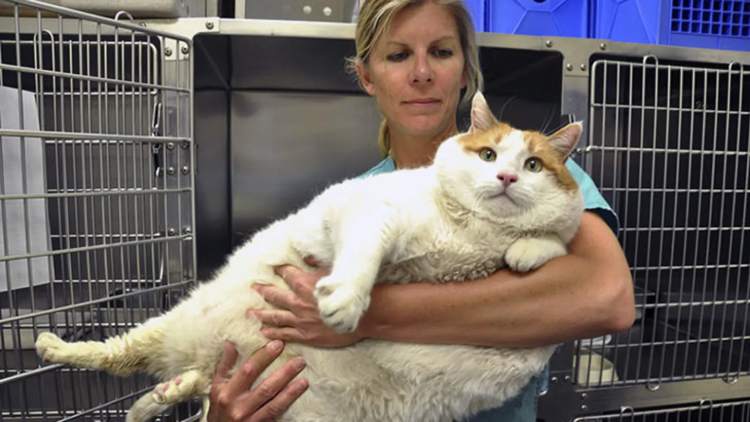
Meow was a famous orange-and-white tabby that weighed more than 39 pounds! The feline garnered international attention due to his obesity. Experts had suggested that Meow’s ideal weight should have been seven to 10 pounds, but his weight was equivalent to that of a human weighing over 600 pounds!
Meow was brought to a shelter named Santa Fe Animal Shelter in New Mexico, USA. The shelter recognized the seriousness of the problem and placed him on a strict high-protein diet to help him lose weight before finding him a forever home. They even planned to conduct public weigh-ins to raise awareness of the pet obesity epidemic and promote pet adoptions.
However, Meow’s condition rapidly deteriorated before he could lose weight. He was immediately rushed to a veterinary hospital for emergency treatment. Despite the best efforts of four veterinarians, Meow passed away due to lung disease.
3 These Siberian tigers from a Chinese Zoo are way too fat to be called healthy.
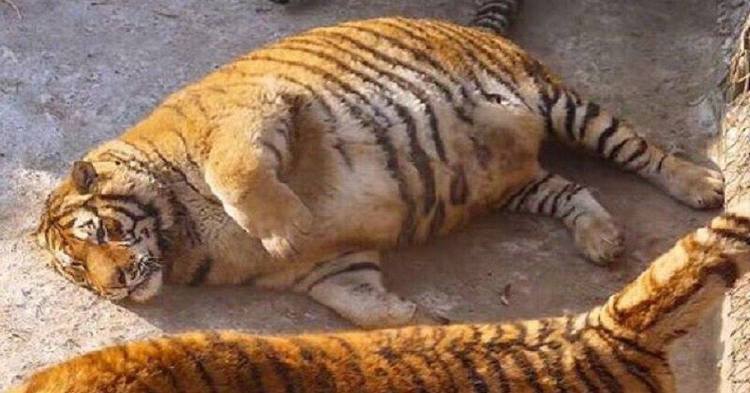
Siberian Tiger Park, spread over 144 hectares in China’s Harbin, Heilongjiang, is considered one of the world’s biggest nature parks for Siberian tigers. However, the park made it to the headlines in 2017 when images of obese Siberian tigers from the park surfaced on the Internet. However, state media claimed that the tigers were normal, and they naturally put on weight for winter.
Nonetheless, various animal welfare organizations were skeptical about what state media said. Experts said that the tigers were definitely overweight, constituting a welfare concern for these animals. According to them, tigers that were so obese were prone to developing cardiovascular or joint issues. Moreover, they pointed out that wild tigers had to control their weight as being fat makes hunting inconvenient. The experts also said that the Siberian tigers’ obesity could be due to medical or dietary reasons.





















